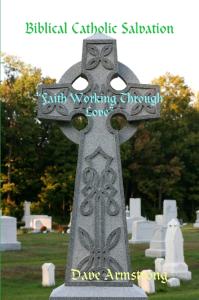
2 Thessalonians 2:13 (RSV) . . . God chose you from the beginning to be saved, through sanctification by the Spirit and belief in the truth.
Protestantism formally separated sanctification from justification in a way contrary to the Bible. Justification saves through faith alone, according to their view. Sanctification and good works, on the other hand, are definitely encouraged and regarded as necessary in the Christian life, but are not a cause of either justification or salvation; only God’s grace and our faith accomplish that. This is the classic Protestant “faith alone” doctrine, or sola fide in Latin, and one of the two “pillars” of the so-called Reformation, along with sola Scriptura (“Bible alone”).
The above passage contradicts this understanding, by directly tying salvation to sanctification. If one is saved “through” sanctification, as St. Paul writes, then it’s impossible to separate sanctification from salvation. This verse and Romans 6:22 are perhaps the two clearest and most decisive refutations of “faith alone” in the New Testament.
The context of the passage (i.e., the entire epistle) is filled with other “Catholic verses” and references to works and sanctification as processes involved in salvation, which isn’t instant and not completely separated from works at all:
1:3-4 . . . your faith is growing abundantly, and the love of every one of you for one another is increasing. [4] Therefore we ourselves boast of you in the churches of God for your steadfastness . . .
1:8-9, 11 inflicting vengeance . . . upon those who do not obey the gospel of our Lord Jesus. [9] They shall suffer the punishment of eternal destruction and exclusion from the presence of the Lord . . . [11] To this end we always pray for you, that our God may make you worthy of his call, and may fulfil every good resolve and work of faith by his power,
2:12 so that all may be condemned who did not believe the truth but had pleasure in unrighteousness.
It follows that all will be saved who believed the truth and had pleasure in righteousness: once again a direct denial of “faith alone”.
2:16-17 Now may our Lord Jesus Christ himself, and God our Father, . . . [17] comfort your hearts and establish them in every good work and word.
3:5 May the Lord direct your hearts to the love of God and to the steadfastness of Christ.
3:13 Brethren, do not be weary in well-doing.
It’s interesting to see how Protestants grapple with this and try to make it fit into their soteriology. John Calvin, in his Commentaries, simply ignores the words, through sanctification, and expresses the standard Protestant view that sanctification flows from a justification already obtained by faith alone and is a “proof” of same. But this is eisegesis:
In sanctification of the spirit, says he, and belief of the truth. This may be explained in two ways, with sanctification, or by sanctification. It is not of much importance which of the two you select, as it is certain that Paul meant simply to introduce, in connection with election, those nearer tokens which manifest to us what is in its own nature incomprehensible, and are conjoined with it by an indissoluble tie. Hence, in order that we may know that we are elected by God, there is no occasion to inquire as to what he decreed before the creation of the world, but we find in ourselves a satisfactory proof if he has sanctified us by his Spirit, — if he has enlightened us in the faith of his gospel. For the gospel is an evidence to us of our adoption, and the Spirit seals it, and those that are led by the Spirit are the sons of God, (Romans 8:14,) and he who by faith possesses Christ has everlasting life. (1 John 5:12.) These things must be carefully observed, lest, overlooking the revelation of God’s will, with which he bids us rest satisfied, we should plunge into a profound labyrinth from a desire to take it from his secret counsel, from the investigation of which he draws us aside. Hence it becomes us to rest satisfied with the faith of the gospel, and that grace of the Spirit by which we have been regenerated. And by this means is refuted the wickedness of those who make the election of God a pretext for every kind of iniquity, while Paul connects it with faith and regeneration in such a manner, that he would not have it judged of by us on any other grounds.
Calvin is eloquent and articulate as always, but unfortunately he doesn’t interact with the actual text. What he does is superimpose previous Protestant man-made tradition onto it.
***
“Please Hit ‘Subscribe’”! If you have received benefit from this or any of my other 4,600+ articles, please follow this blog by signing up (with your email address) on the sidebar to the right (you may have to scroll down a bit), above where there is an icon bar, “Sign Me Up!”: to receive notice when I post a new blog article. This is the equivalent of subscribing to a YouTube channel. Please also consider following me on Twitter / X and purchasing one or more of my 55 books. All of this helps me get more exposure, and (however little!) more income for my full-time apologetics work. Thanks so much and happy reading!
***
Barnes’ Notes on the Bible follows suit: “No one can have evidence that he is chosen to salvation except as he has evidence that he is sanctified by the Spirit . . . ” Again, this ignores what the biblical text actually expresses.
Matthew Poole’s Commentary takes a sort of halfway position:
Through sanctification of the Spirit: election is to the means as well as the end, as Ephesians 1:4. Holiness is not the cause of God’s election, but God hath decreed it to be the way to salvation; without holiness none shall ever see the Lord, Hebrews 12:14.
So does Gill’s Exposition of the Entire Bible:
[H]oliness is not the cause of election, yet is certain by it, and is necessary to salvation; and . . . the doctrine of election is no licentious doctrine, since it provides for and secures true and real holiness.
And so does Meyer’s NT Commentary also. It states that sanctification is “the means by which the election, which has taken place to eternal salvation, was to be realized.”
Expositor’s Greek Testament almost states the Catholic position, but not quite:
[Y]our discipline is of sanctification (contrast 12b) and belief in what is true (contrast 11, 12a), these forming the sphere and the scope (cf. 1 Timothy 2:15, . . .) for salvation being realised. Those who are sanctified and who truly believe shall be saved.
Ellicott’s Commentary for English Readers does far better. It exegetes the text straightforwardly:
The “salvation” is present, begun in this life (Ephesians 2:5; Ephesians 2:8), and carried on along fixed lines, namely, “in sanctification of spirit and belief of truth” (such is the literal rendering). The preposition “in” has here the same force as in 1Thessalonians 4:4; 1Thessalonians 4:7, namely, “by way of,” “by a course of.” If, therefore, God chose the Thessalonian Christians to salvation by a course of sanctification and belief, one thing, at any rate, is clear: that if any of them should leave that course, and fall into the errors and sins denounced in the foregoing verses, then, in the Apostle’s mind, they would have forfeited their salvation, in spite of God’s choice of them.
Perhaps this was because Charles John Ellicott (1819–1905) was an Anglican theologian and bishop, and thus could have had a more Catholic position on faith and works and soteriology in general.
Cambridge Bible for Schools and Colleges is pretty good, too:
This salvation rests on God’s election; at the same time it has its human conditions: salvation (experienced) in sanctification of spirit and faith in the truth. God chooses none to salvation apart from these qualifications; the end implies the way. It is believing and sanctified men who wear “for a helmet the hope of salvation” (1 Thessalonians 5:8). Comp. 1 Peter 1:2 : “Elect … in sanctification of spirit” (or the Spirit).
Jamieson-Fausset-Brown Bible Commentary partially agrees with Ellicott (first paragraph), but it does qualify the meaning (in the second paragraph) to align it with the standard Protestant view:
through—rather as Greek, “in sanctification” as the element in which the choice to salvation had place (compare 1Pe 1:2), standing in contrast to the “unrighteousness,” the element in which Antichrist’s followers are given over by God to damnation (2Th 2:12).
of the Spirit—wrought by the Spirit who sanctifies all the elect people of God, first by eternally consecrating them to perfect holiness in Christ, once for all, next by progressively imparting it.
When all is said and done, I submit that the meaning of “saved, through sanctification” is obvious, and that it doesn’t harmonize with Protestant “faith alone” soteriology. But if a Protestant admitted that, his or her theology would be in a serious crisis. And so they sincerely try to explain it otherwise; but — with all due respect — I think the attempt fails. And it does because holiness or sanctification is not optional with regard to salvation, as Hebrews 12:14 teaches: “Strive . . . for the holiness without which no one will see the Lord.”
*
Practical Matters: Perhaps some of my 4,600+ free online articles (the most comprehensive “one-stop” Catholic apologetics site) or fifty-five books have helped you (by God’s grace) to decide to become Catholic or to return to the Church, or better understand some doctrines and why we believe them.
Or you may believe my work is worthy to support for the purpose of apologetics and evangelism in general. If so, please seriously consider a much-needed financial contribution. I’m always in need of more funds: especially monthly support. “The laborer is worthy of his wages” (1 Tim 5:18, NKJV). 1 December 2021 was my 20th anniversary as a full-time Catholic apologist, and February 2022 marked the 25th anniversary of my blog.
PayPal donations are the easiest: just send to my email address: apologistdave@gmail.com. Here’s also a second page to get to PayPal. You’ll see the term “Catholic Used Book Service”, which is my old side-business. To learn about the different methods of contributing (including Zelle), see my page: About Catholic Apologist Dave Armstrong / Donation Information. Thanks a million from the bottom of my heart!
*
***
*
Photo Credit: cover of a book of mine published in 2010 (see info. and purchase information); the design incorporated a photograph from “SCapture”.
Summary: I examine 2 Thessalonians 2:13: a Bible passage that I believe decisively refutes the Protestant belief in “faith alone” (sola fide) for justification apart from sanctification.

















